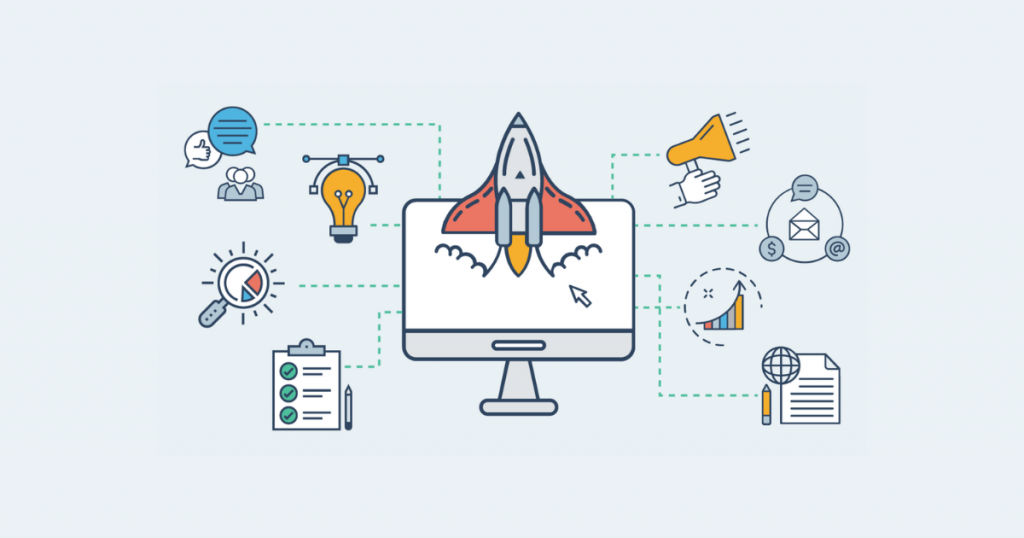
While the Covid-19 pandemic wreaked havoc on most industries around the world, there was one sector that actually saw significant growth during this time. We are talking about software-as-a-service (SaaS) which is among the most attractive technology segments right now.
For the Indian SaaS ecosystem, things look even more promising as the sector is expected to reach a valuation of $1 trillion over the next 10 years.
This was the biggest takeaway from the report titled “Shaping India’s SaaS Landscape“. This new study was put together by SaaSBOOMi in association with their knowledge partner McKinsey & Company and supporting partner NASSCOM.
Although the sector currently employs 40,000 people, it is expected to create around half a million jobs by 2030. This would prove to be a goldmine of opportunities for investors, founders, and IT professionals alike.
In this article, let’s get into further details of this latest report and figure out its implications.
Table of Contents
Key highlights from the SaaSBOOMi Report

Here are the key highlights from the report –
- Being the most attractive technology segment, SaaS drives around 50% of the value creation and compromises on 20% of the enterprise tech spending.
- The Indian SaaS ecosystem will likely reach a valuation of $1 trillion while creating around half a million jobs by the year 2030.
- There is a favorable environment for the Indian SaaS companies due to digital go-to-market, cost-effective customer engagement, and privileged domain expertise.
- Historically speaking, most Indian SaaS companies have underinvested in their growth efforts when compared to global leaders.
- The Indian SaaS start-ups could grow by 10x by scaling talent by 3-6x and attracting 3-4x of current funding levels.
India’s flourishing SaaS Landscape
The report highlights that the Covid-19 pandemic had a big role to play in the unprecedented growth of the SaaS sector over the past year. SaaS products rose in popularity as companies, universities, and governments scrambled towards digital transformation in the aftermath of the pandemic. The need to make products and services available online led to the growth of the SaaS ecosystem in the country and the world.
Indian SaaS companies leveraged this trend to their benefit and ultimately reached new heights in terms of both scale and scope.
As per the report –
- There are about 1000 funded SaaS companies in India with 10 of them being unicorns (valued at over $1 billion).
- With about 40,000 people working in these companies, the total revenue generation is close to $2-3 billion.
Some other interesting facts about India’s flourishing SaaS landscape include –
- 150+ SaaS companies with more than $1M ARR
- $2.6 billion in combined revenue from pure-play Indian SaaS companies
- 30%+ growth in revenue over 2018-2020
- $4 billion in total VC investment in the last 5 years
- 60% SaaS market opportunity outside North America
- <20% market share of the leader in any SaaS segment
The report also suggests that if Indian SaaS providers can execute their full potential, they might generate annual revenues of around $50-70 billion by 2030, winning 4-6% of the global SaaS market.
Investment in Indian SaaS Companies

The report makes an interesting observation that Indian SaaS companies might be missing out on important growth opportunities because of underinvestment.
Those companies with revenues not exceeding $5 million spend only about 25% of revenues on GTM compared to global leaders who spend 80-90% of revenues on GTM.
To reach the $1 trillion milestones, Indian SaaS companies would need to adopt a “growth-first” mindset. They’ll need to focus on scaling and long-term market leadership as opposed to near-term profitability.
The investments in the Indian SaaS industry are rising, reaching up to $1.5 billion in venture capital funding in 2020. But to reach their full potential, companies need to triple or quadruple their funding.
Specifically, there needs to be an increase in funding for seed/early-stage companies.
Job Opportunities in the SaaS Space
According to the ‘Shaping India’s SaaS Landscape’ report, “The Indian SaaS space has the potential to create $1 trillion in value and nearly five lakh jobs by 2030.” The credit behind the success of this phenomenal growth goes to the rapid pace of digital transformation and legacy software firms transitioning to the SaaS space. Currently, the SaaS ecosystem generates around $2-3 billion annually with a strong workforce of nearly 40,000 people.
2020, the year of pandemic, saw six new SaaS unicorns taking shape – Browerstack, Chargebee, Highradius, Innovacer, Postman, and Zenoti. Indian SaaS companies saw an influx of $1.5 billion in 2020, which is an astounding four-fold jump in the past two years. The trend definitely reflects that the SaaS space is here to stay, thus, opening up the job market like never before.
What does the future look like for Indian SaaS companies?
The Covid-19 pandemic has completely changed the way businesses run, with online and remote work becoming the norm. This shift has resulted in companies exploring SaaS platforms more aggressively and as a result, the future of SaaS space seems to be brighter and brighter. During the difficult phase of the Covid-19 crisis, SaaS was the highest-performing category in industries, such as Technology, Media, and Telecom (TMT) industry. According to the research conducted, it is believed that if the Indian SaaS companies operate at their full potential, by 2030 they will be able to generate annual revenues up to $50-70 billion and take control of 4-6% of the global market.
To achieve this growth target, there is a need to expand the number of Indian SaaS unicorns by almost ten times by 2030. India’s rich legacy of IT services and vast talent pool of developers and professional services offer Indian SaaS startups the ‘right to win’ in sectors, such as developer tools and vertical SaaS.
The future of SaaS holds several opportunities, such as strengthening their industry position in horizontal SaaS (CRM, ERP, collaborative apps), increasing their market presence in the US, UK, APAC, and MEA markets, finding opportunities in new growth sectors, such as data management and integration in middleware horizontals, etc.
As per Girish Mathrubootham, founder and CEO of Freshworks, “India is now a hotbed of innovation with nearly 1,000 SaaS companies and 10 unicorns. I couldn’t be prouder of how far this community has come on the journey to bring India’s SaaS industry to the world.”
Currently, there are about 1,000 SaaS companies and 10 unicorns (that are valued at over $1 billion). Manav Garg, CEO & Founder, Eka Software Solutions, Founding Partner SaaSBOOMii said, “India has an exciting opportunity to propel itself on to the world stage as a SaaS force to be reckoned with. While there are challenges ahead, these are not insurmountable and SaaSBoomi is of the view that there is nothing that can stop the Indian SaaS community from building on its strong foundation to make SaaS a preeminent industry in India that employs a lot of talent, contributes significantly to India’s GDP and creates unmatched global products and platforms.”
The success of the new six unicorns during the time of pandemic further cements the fact that the SaaS ecosystem has a bright and successful future ahead.
Key Implications

The entire world, from companies to government agencies to universities, has turned towards remote working and embraced digital transformation as a means to provide their products and services to their customers. This has resulted in the exponential growth of the global SaaS sector with software which includes SaaS, comprising $600 billion out of the $3 trillion global enterprises IT and communications spending market.
With an annual growth rate of 8%, the SaaS market, if it continues its upward trajectory, can reach an estimated worth of $1.3 trillion by 2030. In order to reach its full potential in the next ten years, the SaaS ecosystem needs to increase its funding to three to four times the current levels. This will require the support of industry associations, investors, corporates, and the government.
The growth of the SaaS ecosystem also has its share of challenges and difficulties. According to the report, SaaS companies often face challenges in the early stages of product development and marketing. Finding the right talent is also another area of concern. As per findings of the report, “there is a need to shift to a growth-first mindset with a focus on investing in core operational capabilities to scale and win.”
Manav Garg, CEO & Founder, Eka Software Solutions, Founding Partner SaaSBOOMii said, “The findings in this report will provide Indian founders with insights that will help them engage in long-term planning and accelerate future growth.” Debjani Ghosh, President of the National Association of Software and Services shared her thoughts and said, “Increasing digital transformation is accelerating SaaS adoption aiming to perform analytics and artificial intelligence.”
By collectively taking the required actions and handling the challenges, it is possible to transform the SaaS ecosystem into a thriving industry that contributes significantly towards India’s GDP, creates unparalleled products and platforms globally, and opens up a significant job market.
Top Quotes
Manav Garg, CEO & Founder, Eka Software Solutions, Founding Partner SaaSBOOMii: “India has an exciting opportunity to propel itself on to the world stage as a SaaS force to be reckoned with. While there are challenges ahead, these are not insurmountable and SaaSBoomi is of the view that there is nothing that can stop the Indian SaaS community from building on its strong foundation to make SaaS a preeminent industry in India that employs a lot of talent, contributes significantly to India’s GDP and creates unmatched global products and platforms. The findings in this report will provide Indian founders with insights that will help them engage in long-term planning and accelerate future growth.”
Debjani Ghosh, President, NASSCOM, said, “The Indian SaaS ecosystem has the potential to create $1 trillion in value and nearly half a million jobs by 2030, owing to digital transformation and automation in organizations across sectors. Increasing digital transformation is accelerating SaaS adoption aiming to perform analytics & AI and data management applications. To create awareness around the potential of SaaS in India, it is imperative for the Government to collaborate with industry associations, investors, and corporates, and drive large-scale training programs by partnering with universities and institutions.”
Girish Mathrubootham, founder and CEO of Freshworks, said, “India is now a hotbed of innovation with nearly 1,000 SaaS companies and 10 unicorns. I couldn’t be prouder of how far this community has come on the journey to bring India’s SaaS industry to the world. When we share knowledge, experience, successes, and even failures, as we do at SaaSBOOMi, we make entrepreneurship more accessible than before.”
In case you want to check out the SaaSBOOMi report, you can do so here.







1 Comment
Pingback: SaaS weekly roundup #28: FaaS provider Rapyd acquires Valitor, PineLabs, Coda raise $100million, & more - SaaSworthy Blog SaaS weekly roundup #28: FaaS provider Rapyd acquires Valitor, PineLabs, Coda raise $100million, & more